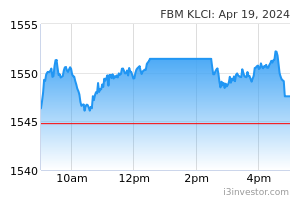Kawan Food credits 1Q outperformance to nimbleness and speed

AMID the sea of lacklustre first-quarter financial results announced recently, Kawan Food Bhd was among the few companies that reported stronger earnings despite economic activity nearly coming to a halt when the Movement Control Order was implemented from March 18.
The stronger year-on-year earnings were the result of the company’s nimbleness and speed in responding to the crisis, which helped it manoeuvre through the challenging times during the MCO period, says Kawan Food managing director Timothy Tan.
“Sales for the first two months of the first quarter were slow but they surged in March, not only because of the MCO in Malaysia but also because of the lockdown in other countries. Up till today, we are still working on fulfilling the orders made.
“There was a lot of planning involved, from decisions on what to produce to the logistics and getting approvals to ensure that we would still be able to operate during the MCO period,” he continues.
Beyond the first quarter, Tan says sales are “still high”. “So far, although I don’t have the full numbers yet, I think we might see another good quarter of growth.”
Sales in Malaysia have contributed to a large part of the growth, owing to the deliberate decision by Kawan Food to focus on the domestic market for now, according to Tan.
With most people staying home during the MCO period, the company’s products have been flying off the supermarket shelves as consumers stock up on convenient, easy-to-prepare food.
Kawan Food’s year-old e-commerce platform has also seen a surge in sales, even of new products. “When customers log on to our website, they can see an array of products that are unavailable in the supermarkets. So, we saw a surge in demand for such products as well. In fact, we have maxed out our output and volume to meet this demand,” says Tan.
The company’s e-commerce sales for the first five months of this year have already more than doubled those for the whole of 2019. Last year, it reported that sales through its e-commerce platform stood at RM130,000.
That said, Tan believes that demand on the online platform has likely reached its peak. “From the database that we have collected, we found that it is the younger demographic of customers who are keen on trying out the new offerings that we have. So, we will continue marketing to them and continue increasing our number of products to retain them.”
As Malaysia relaxes movement restrictions and countries around the world ease out of lockdowns, will demand for frozen foods decline?
Tan opines that Kawan Food’s offerings will continue to be in demand with more people working from and eating at home in the new normal following the pandemic.
CGS-CIMB Research takes the same view in a May 28 report, saying that it expects this trend of higher demand for Kawan Food products, both locally and in its export market, to continue with consumers likely to purchase more frozen foods and staying home due to fears over the spread of Covid-19.
In contrast, Inter-Pacific Securities Research says the buying strength could dissipate as restrictions ease. However, if a resurgence of Covid-19 cases results in movement control restrictions being re-implemented, Kawan Food could see increased demand for its products, it adds.
“We recommend investors to remain mindful of further developments as the current ‘Covid-19 climate’ is viewed to be a very favourable tailwind to earnings growth, at least within Malaysia,” the research house says in a May 29 report.
For the second half of the year, Tan says the company will be back to pushing export sales as the situation normalises.
It is worth noting that more than half of Kawan Food’s revenue is derived from the export market. In 2019, the overseas market accounted for 60% of its revenue, with the rest coming from the local market.
For the first quarter ended March 31, 2020, net profit increased slightly more than four times to RM6.62 million from RM1.57 million a year ago. Revenue was up 6% to RM53.64 million from RM50.32 million previously.
The large increase in net profit was the result of improved efficiency from cost-optimisation measures and automation efforts. The stronger US dollar also worked in the company’s favour given its large export market.
As at March 31, Kawan Food had a net cash pile of RM32.7 million.
The two research houses covering the stock have upgraded their calls from “neutral” to “buy” as well as raised their target prices — CGS-CIMB Research to RM2 and Inter-Pacific Securities Research to RM2.14.
Last Wednesday, Kawan Food closed at RM1.88, giving the company a market capitalisation of RM701 million.
( 24,36 % )
( 39,38 % )
( 36,26 % )


